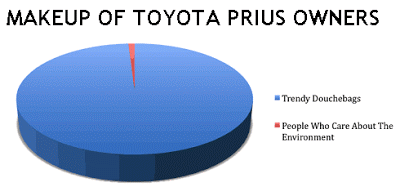 By Green Hell Blog
By Green Hell Blog
Check out this Washington Post letter-to-the-editor (June 21):
The June 9 Business article “Toyota Wants New Prius to Be America’s Next Top Model” called the Prius an “eco-icon” and said that it has allowed Americans to “advertise their eco-correctness.” A Toyota spokesman was quoted as saying that many Prius buyers want to “make an environmental statement.” The Prius’s reputation as a “green” car is completely undeserved. The culprit is its nickel metal hydride battery. The nickel is mined in Sudbury, Ontario, and smelted nearby, doing damage to the local environment. The smelted nickel is shipped to Wales, where it is refined. Then it is sent to China to be made into nickel foam. Then it goes to Japan, where it is made into a battery. Then it goes into cars, some of which are shipped to the United States and some of which go to Europe. All of that seaborne transport consumes a lot of fossil fuel. CNW Marketing rates cars on the combined energy needed “to plan, build, sell, drive and dispose of a vehicle from initial concept to scrappage.” A Prius costs $2.87 per lifetime mile. By comparison, an H3 Hummer costs $2.07 per lifetime mile. Then there will be the problem of disposing of the used batteries. This is not a “green” car; it is a “brown” one. JAMES CLIVIE GOODWIN Fairfax
Read more about the follies of hybrids and biofuels HERE.
It does get good gas milage though. If gas prices got high enough, it might actually make its high price worth it.
As far as being a "green car" that is not true, because the batteries are bad for the environement, and the less C02 it puts out is bad for the environement, because we need more C02.
I *heart* C02.
Yes, agreed totally. And as for saving gas money…well, when it comes time to replace the multi-thousand dollar batteries you`ll soon realize it costs more in the long run. Not only that, a Hummer is better built and on the road for much longer, thus keeping costs down and keeping more cars out of our landfills!